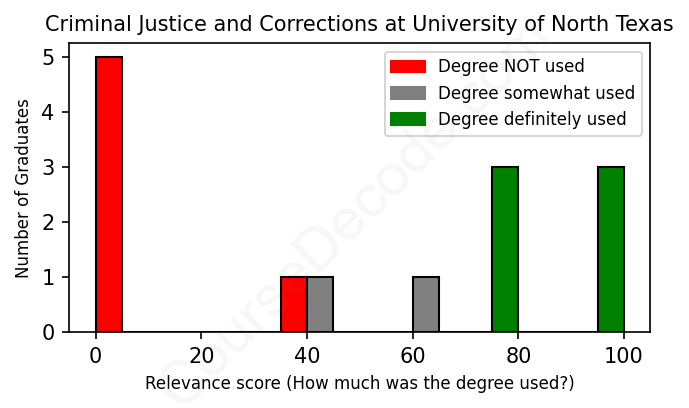
First, some facts. Of the Criminal Justice and Corrections graduates from University of North Texas we've analyzed , here's how many have used (or NOT used) their degree in their career:

These are estimates based on AI analysis of 14 LinkedIn profiles (see below).
The verdict? Significantly below average. Overall, with an average relevance score of 47%, Criminal Justice and Corrections graduates from University of North Texas have a much lower likelihood (-20%) of finding work in this field compared to the average graduate across all fields:
And for comparison, here's the chart for all profiles we've looked at across all degrees.
Also, after graduating, only 21% of these graduates have pursued further education other than another Bachelor's degree (such as a Masters degree or other), compared to the average across all profiles of 35%. This suggests a Bachelors degree is enough for most Criminal Justice and Corrections graduates, and it's normal to look for work straight after graduation.
See the details:
|
Relevance score: 0% We think this person has NOT gone into a career related to their degree. We think this person has NOT gone into a career related to their degree.
DEGREE INFOGraduated in 2021 from University of North Texas with a Bachelor of Science - BS in Criminal Justice and Corrections. Also pursued further education since (see below). JOB HISTORY SINCE GRADUATIONAutomotive Technician City Garage Jun 2022 - Feb 2023 Technician  Ewing Subaru of Plano Mar 2023 - Aug 2023 Automotive Technician  Five Star Ford Dallas Nov 2023 - Present FURTHER DEGREES DONE SINCE GRADUATINGAssociate's degreeDallas College 2022 - 2024 ABOUTNo information provided. |
The top 10 most common jobs done by the graduates we've analyzed (ranked most common to least) are:
From what I've seen, graduates from the University of North Texas with a degree in Criminal Justice and Corrections have pursued a pretty diverse range of jobs. Many of these roles are indeed tied to the skills and knowledge acquired through their studies, especially in fields like loss prevention, fraud investigation, and juvenile supervision. For instance, positions like Parole Officer, Juvenile Supervision Officer, and various roles in loss prevention are directly applicable to what they learned, showcasing a clear connection to the criminal justice system. These jobs not only align with the degree but also demonstrate a practical application of their education in real-world scenarios.
However, there's also a notable portion of graduates who have veered off into fields that don’t really relate to Criminal Justice and Corrections. Roles like Realtor, Casual Team Member at ToysRUs, or Laboratory Technician primarily involve skills that are not centered around criminal justice. It feels like while a good chunk of these graduates found relevant paths, a significant number also ended up in jobs that don’t necessarily require their specialized knowledge. So, if you're considering this degree, it might be wise to think about how you want to steer your career after graduation—you might want to make sure you're applying your skills in a way that sparks your interest and utilizes your education!
Here is a visual representation of the most common words in job titles for Criminal Justice and Corrections graduates (this is across all Criminal Justice and Corrections graduates we've analyzed, not just those who went to University of North Texas):

Looking at the career trajectories of graduates from the Criminal Justice and Corrections program at the University of North Texas, it seems like there are mixed outcomes. Many graduates land positions directly related to criminal justice shortly after graduation, often securing internships or entry-level roles in law enforcement, fraud investigation, or juvenile justice. For instance, some early jobs include roles like Parole Officer or Juvenile Supervision Officer, which clearly align with their studies. However, there’s also a noticeable trend where some graduates take a detour into unrelated fields or retail jobs, especially in their early career, perhaps due to market conditions or personal preferences.
As we look at the 5 to 10-year mark after graduation, there's a bit of a split. Some individuals have successfully climbed the ranks in their chosen fields, moving into managerial roles in financial crimes or law enforcement. For example, a graduate who started as a Fraud Analyst ended up as a Risk Solutions Consultant at Visa, which showcases a successful transition into relevant fields. On the other hand, others seem to have veered off course entirely, exploring careers in real estate or even automotive technician roles that don’t directly connect to their Criminal Justice degree. Overall, while many graduates find rewarding careers in the criminal justice realm, others might end up in jobs that, while perhaps stable, don’t fully leverage their education or passion for the field.
Getting a Bachelor’s degree in Criminal Justice and Corrections at the University of North Texas is generally considered to be manageable, especially compared to some other majors that are super heavy on math or science. It involves a fair bit of reading, writing, and understanding the legal system, but if you're genuinely interested in the subject, it can be pretty engaging. The courses might challenge you to think critically about crime, law enforcement, and the justice system, but they usually aren’t overwhelmingly difficult. Plus, you’ll have access to resources and support from your professors and fellow students, which can make the whole experience smoother. So if you’ve got a passion for the field, you’ll likely find it to be a rewarding, albeit sometimes challenging, journey!
Most commonly, in the LinkedIn profiles we've looked at, it takes people 2 years to finish a Bachelor degree in Criminal Justice and Corrections.
So, looking at these graduates from the University of North Texas, it seems like they’ve had a pretty mixed bag when it comes to salaries. For those who graduated earlier, like the 2010 grad who went from a Children’s Advocacy intern to a realtor, their path suggests a decent potential for earnings as realtors can make good money, especially if they're successful. The 2012 grad has a solid trajectory into higher-level fraud roles, hinting at a likely good salary, especially with a recent position at Visa. Others from 2013 and beyond, like the parole officer and various managers, have stable positions but may not necessarily be raking in the big bucks unless they climb higher in their careers. The more recent grads still seem to be finding their footing, with some in roles that are not the highest-paying (like yard tech and technician positions). Overall, while some have definitely landed on paths that can lead to decent earnings, others might be starting off on lower-paying jobs, but hopefully, they'll find their way up the ladder as they gain more experience!
Here is a visual representation of the most common words seen in the "about" section of LinkedIn profiles who have a Bachelor degree in Criminal Justice and Corrections (this is across all Criminal Justice and Corrections graduates we've analyzed, not just those who went to University of North Texas). This may or may not be useful:

Here are all colleges offering a Bachelor degree in Criminal Justice and Corrections (ordered by the average relevance score of their Criminal Justice and Corrections graduates, best to worst) where we have analyzed at least 10 of their graduates:
| College | Score | Count |
|---|---|---|
 American Military University American Military University
|
52 | 13 |
 Bridgewater State University Bridgewater State University
|
50 | 13 |
 University of Central Florida University of Central Florida
|
47 | 14 |
 University of North Texas University of North Texas
|
47 | 14 |
 University of Phoenix University of Phoenix
|
41 | 23 |
 University of Cincinnati University of Cincinnati
|
41 | 12 |
 Sam Houston State University Sam Houston State University
|
35 | 22 |
 John Jay College (CUNY) John Jay College (CUNY)
|
35 | 12 |
 Ferris State University Ferris State University
|
34 | 14 |
 Florida International University Florida International University
|
31 | 17 |
 Liberty University Liberty University
|
31 | 10 |
 California State University-Sacramento California State University-Sacramento
|
24 | 14 |
 Colorado Technical University Colorado Technical University
|
24 | 16 |